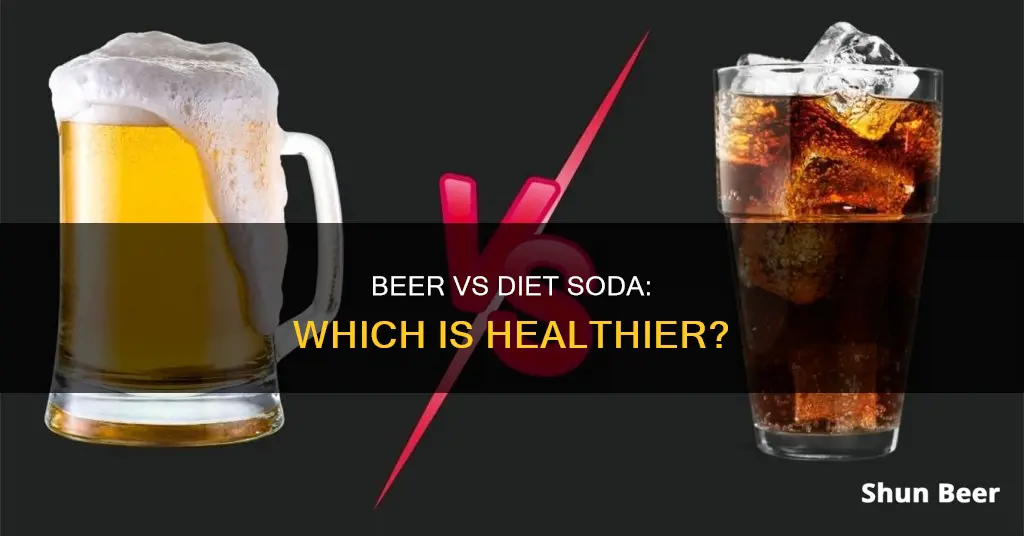
Beer or diet soda: which is healthier? It's a tricky question, as neither drink is considered healthy. Both are indulgences that should be enjoyed in moderation as part of a well-balanced diet and exercise routine. However, if you're trying to choose the healthier option between the two, there are a few things to consider.
First, let's look at the sugar content. A 12-ounce can of standard soda typically contains about 39 grams of sugar, which is much higher than the recommended daily intake. Beer, on the other hand, only has around 1 to 2 grams of residual sugar from the fermentation process. So, when it comes to sugar, beer is the clear winner.
What about calories? Soda and beer both provide a significant number of empty calories. A standard can of soda contains around 140 to 170 calories, while a beer typically has 100 to 150 calories. Light beers and diet sodas have fewer calories, but they're still not considered nutritious choices.
The ingredients in beer and soda are also worth considering. Beer is traditionally made from water, malt, hops, and yeast, while soda contains carbonated water, high levels of sugar or artificial sweeteners, and various controversial additives. While beer contains some nutrients like B vitamins and antioxidants, the amounts are very low.
Finally, let's talk about the effects on the body. Both beer and soda can have negative consequences. Excessive alcohol consumption can lead to health problems such as an increased risk of stroke, hypertension, weight gain, and certain cancers. Meanwhile, the high sugar content in soda has been linked to weight gain, type 2 diabetes, heart disease, and tooth decay. Diet soda, on the other hand, has been associated with an increased risk of metabolic syndrome and cardiovascular disease, despite having no sugar or calories.
So, which is healthier? While beer may have a slight edge over regular soda due to its lower sugar and calorie content, the truth is that neither drink is truly healthy. Moderation is key, and it's important to be mindful of the potential health risks associated with both beverages.
What You'll Learn

Beer has fewer calories than regular soda, but more than diet soda
When it comes to the calorie content of beer and soda, it's important to differentiate between regular soda and diet soda. Beer typically contains fewer calories than regular soda but more calories than diet soda.
A standard 12-ounce can of beer contains approximately 100 to 150 calories, depending on the type and alcohol content. Light beers usually have lower alcohol content and fewer calories, ranging from 90 to 100 calories per serving. Regular beers, on the other hand, have moderate alcohol content and can contain 140 to 180 calories. Craft beers and specialty beers can have a wider range of calorie content, with craft beers averaging 150 to 250 calories, while high-alcohol beers can contain 200 to 350 calories or more.
On the other hand, a 12-ounce can of regular soda typically contains 140 to 170 calories. Diet sodas, in contrast, often have zero or minimal calories due to the use of artificial sweeteners like aspartame. So, if calorie intake is a primary concern, diet soda can be a better choice than beer in terms of reducing calorie intake.
However, it's important to note that just because a beverage has zero calories doesn't necessarily make it the healthier option. The sweetness of diet soda, for example, could increase your appetite or craving for sugary products and beverages, potentially leading to other high-calorie food and drink choices throughout the day.
Beer, while typically having fewer calories than regular soda, still contributes a significant amount of calories, especially when consumed in larger quantities. Additionally, beer contains alcohol, which can increase appetite and reduce inhibitions, potentially leading to overeating.
In summary, while beer generally has fewer calories than regular soda, it contains more calories than diet soda. However, the choice between these beverages depends on individual preferences and nutritional needs. Both beer and soda should be consumed in moderation as part of a well-balanced diet and exercise routine.
Apple Cider Beer: Healthy Beverage or Not?
You may want to see also

Beer has a lower acidic content than soda
When it comes to the acidity of beer and soda, beer is the less acidic beverage of the two. Most sodas are highly acidic due to the presence of citric, phosphorus, and other acids, which give them their fizziness. The pH scale ranges from 0 to 14, with 7 being neutral. Values below 7 indicate acidity, while values above 7 indicate alkalinity. Most sodas have a pH between 2.5 and 4, making them significantly more acidic than water, which has a pH of around 7. The high acidity of soda can have several negative effects on the body.
Firstly, the acid in soda can erode tooth enamel over time, leading to dental cavities and tooth sensitivity. Enamel is a protective coating on teeth that prevents them from decaying and gives them their unique colour. Once enamel is lost, it cannot be regenerated by the body. Secondly, some people may experience acid reflux or heartburn after consuming highly acidic beverages like soda. Finally, some studies suggest that excessive consumption of acidic beverages may negatively impact bone health over time.
Beer, on the other hand, typically has a milder acidity. Like other carbonated beverages, beer contains carbonic acid, which forms when carbon dioxide (CO2) dissolves in water. This carbonation gives beer its characteristic fizziness and contributes to its acidity. In addition, beer may contain other acids that occur naturally during the brewing process. The pH of beer can vary depending on the style and brewing process, but most beers have a pH range of about 4 to 4.5, making them slightly acidic. While beer is acidic, its acidity is generally not a significant health concern when consumed in moderation. Therefore, when comparing beer and soda in terms of acidity, beer is the less acidic option.
Partake Beer: Healthy Choice or Marketing Gimmick?
You may want to see also

Beer has a higher alcoholic content than soda
Beer and soda are both considered indulgences that should be enjoyed in moderation and neither is considered a healthy drink. However, beer has a higher alcoholic content than soda, which is an important distinction when comparing the two.
Alcoholic beverages, including beer, can have both positive and negative effects on health depending on the amount consumed. In moderation (defined as 2 servings per day for men and 1 serving per day for women, with 1 serving = 12 oz of beer), ethanol in beer and other alcoholic drinks is associated with some health benefits. These benefits include a reduced risk of heart attack and stroke, a lower risk of type 2 diabetes, and improved brain function. Beer also has a higher water content and a diuretic effect, which is associated with a decreased risk of kidney stones. Additionally, beer contains several B vitamins, some fibre, magnesium, calcium, and the antioxidant selenium.
On the other hand, heavy alcohol consumption can have serious negative health effects. These include an increased risk of stroke, chronic hypertension, weight gain, and certain cancers. Alcohol can also increase hunger and lead to overeating. Beer, in particular, typically contains around 150 calories per 12-ounce serving, which can contribute to weight gain if consumed in excess.
Soda, on the other hand, does not contain any alcohol. Regular soda is high in sugar, typically containing about 39 grams (or 9 teaspoons) of sugar per 12-ounce can. This is well above the recommended daily sugar intake of 25 grams for women and 36 grams for men by the American Heart Association. High sugar intake is linked to an increased risk of health issues such as high blood pressure, inflammation, weight gain, diabetes, and fatty liver disease.
Diet soda, which is artificially sweetened, contains little to no added sugar. While this may reduce the risk of health issues associated with high sugar intake, some studies link diet soda to other potential negative health effects such as an increased risk of metabolic syndrome and cardiovascular disease.
In summary, while both beer and soda have their drawbacks, the higher alcoholic content of beer is an important distinction when comparing the two. Alcohol can have both positive and negative effects on health, depending on the amount consumed. Therefore, when considering which is healthier, it is important to take into account not only the nutritional content but also the potential effects of alcohol consumption.
Hoegaarden Beer: Healthy or Harmful?
You may want to see also

Beer has a higher sugar content than diet soda, but less than regular soda
When it comes to sugar content, beer falls somewhere between regular soda and diet soda. A 12-ounce can of standard soda contains about 39 grams of sugar, which far exceeds the recommended daily sugar intake for both men and women. Beer, on the other hand, typically contains only 1 to 2 grams of sugar in a 12-ounce serving, with light beers having slightly less. Most of the sugar in beer comes from the natural sugars in the grains used during brewing, and the fermentation process further reduces the sugar content.
While beer has a lower sugar content than regular soda, it still contains more sugar than diet soda. Diet sodas are artificially sweetened and offer little to no added sugar. However, it is important to note that both regular soda and diet soda have been linked to negative health effects. Regular soda consumption increases the risk of health issues such as high blood pressure, inflammation, weight gain, diabetes, and fatty liver disease. Meanwhile, diet sodas have been associated with an increased risk of metabolic syndrome and cardiovascular disease.
Beer, while having more sugar than diet soda, may offer some health benefits when consumed in moderation. Studies suggest that ethanol in beer, in moderate amounts, can reduce the risk of heart attack, stroke, and type 2 diabetes, as well as improve brain function. Beer also has a higher water content and a diuretic effect, which may decrease the risk of kidney stones. Additionally, beer contains B vitamins, fibre, magnesium, calcium, and the antioxidant selenium.
However, excessive alcohol consumption, including beer, can lead to serious health problems. Heavy drinking can increase the risk of stroke, hypertension, weight gain, and certain cancers. Beer can also increase hunger and contribute to overeating. Therefore, it is crucial to consume beer in moderation as part of a well-balanced diet and exercise routine.
Beer for Dogs: Healthy or Harmful?
You may want to see also

Beer has a diuretic effect, which can be beneficial for kidney health
The diuretic effect of beer is associated with a decreased risk of kidney stones and other kidney-related issues. Beer can help increase urine output, which can aid in the passage of kidney stones and prevent them from causing blockages in the urinary tract. Additionally, the diuretic effect of beer can help reduce the risk of dehydration, which is a common cause of kidney stones. By promoting urine production, beer may help prevent the concentration of urine and the crystallization of minerals that lead to kidney stone formation.
Moreover, the diuretic effect of beer can also have indirect benefits for kidney health. By increasing urine output, beer can help reduce the risk of urinary tract infections. Kidney stones can provide a surface for bacteria to adhere to, increasing the risk of infections. By flushing out the kidneys and urinary tract, beer may help reduce the risk of these infections.
However, it is important to note that excessive beer consumption can have negative effects on kidney health. Heavy drinking can increase the risk of high blood pressure and Type 2 diabetes, which are common causes of chronic kidney disease. Additionally, alcohol can interfere with kidney function, particularly in conjunction with liver disease. Chronic alcoholic patients may experience alterations in kidney structure and function, including impaired sodium and fluid handling, which can lead to acute kidney failure. Therefore, it is crucial to consume beer in moderation and be mindful of its effects on overall health.
In conclusion, while beer has a diuretic effect that can provide some benefits for kidney health, it is important to consume it in moderation as part of a balanced lifestyle. Excessive beer consumption can lead to dehydration and increase the risk of kidney-related issues, such as kidney stones and chronic kidney disease. Consulting with a healthcare professional or registered dietitian can help individuals make informed choices about their beer consumption and maintain optimal kidney health.
Beer's Benefits: Healthy Bones, Strong Body?
You may want to see also
Frequently asked questions
A 12-ounce can of standard soda contains about 39 grams of sugar, which is equal to about 9 teaspoons of sugar per can. Beer, on the other hand, contains a small amount of residual sugar from the fermentation process, with a standard 12-ounce serving of regular beer containing around 1 to 2 grams of sugar.
A standard 12-ounce can of beer contains approximately 100 to 150 calories, while a 12-ounce can of soda contains 140 to 170 calories.
Beer is traditionally made from water, grain, hops, and yeast, while diet soda is made from carbonated water and artificial sweeteners such as aspartame or saccharin.
Beer is often described as a very filling beverage due to its high calorie and carbohydrate content, as well as the presence of alcohol. Soda, on the other hand, suppresses the natural feeling of fullness after a meal, leading to increased hunger and snacking.
Excessive alcohol consumption can lead to health problems such as an increased risk of stroke, chronic hypertension, weight gain, and certain cancers. Regularly consuming high levels of added sugar in soda can also increase the risk of higher blood pressure, inflammation, weight gain, diabetes, and fatty liver disease. Diet soda, while having zero or minimal calories, has also been linked to potential negative health effects such as an increased risk of metabolic syndrome and cardiovascular disease.







